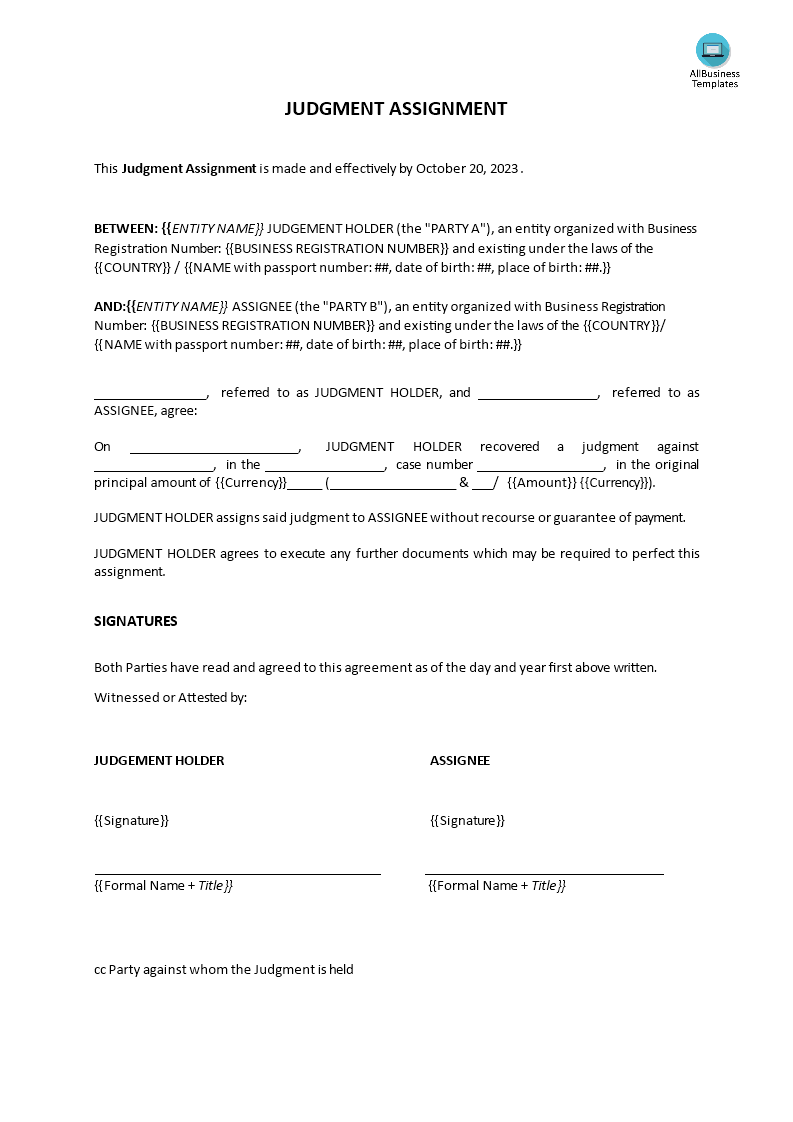Judgment Assignment
Save, fill-In The Blanks, Print, Done!

Download Judgment Assignment
Today: USD 2.99
Download It Now

Available premium file formats:
Microsoft Word (.docx)- This Document Has Been Certified by a Professional
- 100% customizable
- This is a digital download (24.51 kB)
- Language: English
- You will receive a link to download the file as soon as your payment goes through.
- We recommend downloading this file onto your computer.
What is the assignment of judgment in the legal system? What is your understanding of assignment judgment? Our Judgment Assignment template is designed to help you quickly and easily create a professional judgment assignment. It comes with all the necessary instructions and formatting guidelines. Download this Judgment Assignment now!
A Judgment Assignment is a legal process by which a judgment creditor transfers their rights to collect a court-awarded judgment to another party. This assignment typically involves the sale or transfer of the judgment to a third party, often referred to as the "judgment assignee" or "assignee." In exchange for the assignment, the judgment creditor receives a lump-sum payment from the assignee, allowing them to collect at least a portion of the judgment amount immediately, rather than waiting for the debtor to make payments over time.
Here are the key elements and considerations related to a Judgment Assignment:
- Judgment Creditor: The judgment creditor is the party who has obtained a legal judgment from a court against a debtor (judgment debtor). This judgment could be the result of a lawsuit involving matters such as unpaid debts, damages, or breach of contract.
- Judgment Debtor: The judgment debtor is the party against whom the judgment was issued. This party owes a specific amount of money as determined by the court.
- Assignment Agreement: The judgment creditor and the judgment assignee enter into an Assignment Agreement, which outlines the terms and conditions of the judgment transfer. This agreement typically specifies the amount to be paid to the judgment creditor in exchange for the assignment of the judgment rights.
- Payment to Creditor: Upon executing the Assignment Agreement, the judgment assignee pays the agreed-upon amount to the judgment creditor. This payment provides the judgment creditor with immediate funds, and they relinquish their rights to collect the judgment directly from the judgment debtor.
- Rights and Responsibilities: After the assignment, the judgment assignee assumes the rights and responsibilities of the judgment creditor regarding the collection of the judgment. This includes pursuing collection efforts, such as garnishing wages, seizing assets, or negotiating settlements with the judgment debtor.
- Collection Efforts: The judgment assignee may use various legal means to collect the judgment amount from the judgment debtor. The specific methods and procedures may vary by jurisdiction.
- Legal Compliance: The collection efforts must comply with applicable laws and regulations, including those governing debt collection practices and consumer protection.
- Amount Collected: The judgment assignee typically collects the judgment amount plus any additional costs or fees associated with collection efforts. Any excess collected beyond what was paid to the judgment creditor usually belongs to the judgment assignee.
Judgment assignments can be beneficial for judgment creditors who want to receive immediate payment for their judgments rather than engaging in lengthy and uncertain collection efforts.
Download this professional legal Judgment Assignment template if you find yourself in this situation and save yourself time, and effort and probably reduce some of the lawyer fees! Using our legal templates will help you to reach the next level of success in your education, work, and business! However, we still recommend you to consider consulting a local law firm in case of doubt to support you in this matter.
DISCLAIMER
Nothing on this site shall be considered legal advice and no attorney-client relationship is established.
Leave a Reply. If you have any questions or remarks, feel free to post them below.
Related templates
Latest templates
Latest topics
- Excel Templates
Where do I find templates for Excel? How do I create a template in Excel? Check these editable and printable Excel Templates and download them directly! - GDPR Compliance Templates
What do you need to become GDPR compliant? Are you looking for useful GDPR document templates to make you compliant? All these compliance documents will be available to download instantly... - Google Docs Templates
How to create documents in Google Docs? We provide Google Docs compatible template and these are the reasons why it's useful to work with Google Docs... - IT Security Standards Kit
What are IT Security Standards? Check out our collection of this newly updated IT Security Kit Standard templates, including policies, controls, processes, checklists, procedures and other documents. - Letter Format
How to format a letter? Here is a brief overview of common letter formats and templates in USA and UK and get inspirited immediately!
cheese
